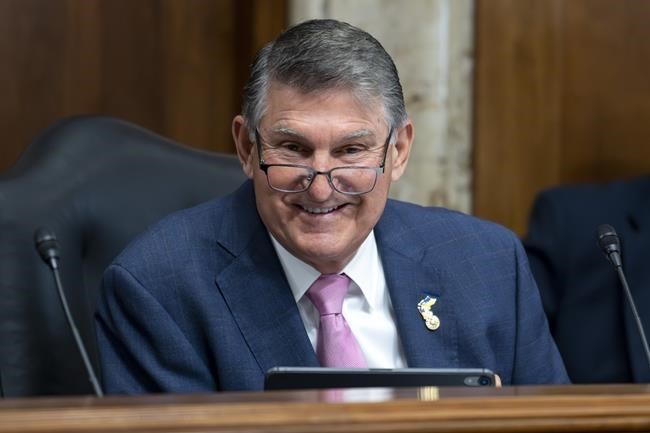WASHINGTON — In the land of partisan blinders, the one named Manchin is still king, it seems.
Political Washington's second most powerful Joe, not far these days behind the one in the White House, took a victory lap Friday to celebrate that rarest of modern-day policy triumphs: getting a pipeline project approved.
Late Thursday, the moderate swing-vote senator cheered passage in the Senate of a bill to avert a U.S. debt default — legislation that, thanks to Manchin, also fast-tracks the controversial 500-kilometre Mountain Valley pipeline.
The project "opens up markets for our natural resources, giving us untold new revenue sources and developing industries that our grandchildren and future generations will benefit from," Manchin said in a Twitter video after the vote.
"West Virginia is America's energy MVP — not only because we power the nation, but also because we show the nation that when you work together, you can accomplish great things for our country."
It's the kind of procedural magic trick that demands the horse-trading antics that are Capitol Hill's stock-in-trade, a bit of legislative sleight of hand that fossil-fuel champions in Canada can only dream of.
So suddenly did Mountain Valley's fortunes change this week that Virginia Democrats like Sen. Tim Kaine and Sen. Jennifer McClellan — through whose state the pipeline will run — didn't even get a heads-up from the White House.
Kaine filed an amendment to the bill Thursday before the final vote in a last-ditch effort to get the pipeline approvals excised, but it went down to defeat along with a host of other last-minute efforts.
"We shouldn't let an unhappy corporation go to Congress to bypass the process everybody else goes through," he said in a statement, describing himself as "deeply disappointed" that his amendment didn't survive.
"Everyday people don't get that deal."
Progressives and environmental groups were no less apoplectic.
"In manufacturing this crisis, our government has said the quiet part out loud: America is still open for business when it comes to the fossil fuel industry," said Sierra Club executive director Ben Jealous.
"It did not have to be this way. The American people deserve better from their government."
By fast-tracking Mountain Valley as well as streamlining the environmental assessment and permitting process, Congress and the White House have created a "dangerous precedent" for other projects, the group says.
Top of their list: Line 5, the Enbridge-owned, cross-border liquids pipeline built in 1953 that just like its West Virginia cousin is the subject of several U.S. legal challenges, most notably in Wisconsin and Michigan.
They say the pipeline poses a persistent threat to tribal lands, natural areas and important drinking water sources, both along the edge of Lake Superior as well as in the Straits of Mackinac, where it crosses the Great Lakes.
"Letting this gambit move forward risks opening the floodgates to any pet fossil fuel project across the country to be completely exempted from environmental protections."
Enbridge insisted that the passage of the legislation — known officially as the Fiscal Responsibility Act — will have no bearing on Line 5's difficulties or the company's strategy going forward.
"There is no impact" from the vote on Line 5, Enbridge spokesman Ryan Duffy said Friday.
Some insiders say if the bill demonstrates anything, it's that there is still room in the U.S. to negotiate practical solutions to fossil-fuel disputes like those that have ensnared Line 5 and Mountain Valley.
For its part, the White House defended the deal Friday, acknowledging — as they have done for weeks — that not everyone was going to emerge from the debt fracas having secured everything they wanted.
"We've been very clear and consistent for months that the president supported Sen. Manchin's permitting bill, which included this project," press secretary Karine Jean-Pierre told the daily press briefing.
"We may not love everything in the bill, but we support it and we have repeatedly called on Congress to pass it."
The legislation passed Thursday was the culmination of a dispute between the White House and congressional Republicans, who refused to raise the country's debt ceiling — a legislative limit on how much the government is allowed to borrow — unless Democrats agreed to deep spending cuts.
Those cuts, though not as deep as some Republicans wanted, include a clawback of unspent COVID-19 relief money, tougher work requirements for certain social programs and a scaled-down funding boon for the IRS.
In exchange, the $31.4-trillion debt limit will be suspended until early 2025, after next year's presidential election. Treasury Secretary Janet Yellen had warned that the government was poised to run out of money as early as Monday.
President Joe Biden was scheduled to speak later Friday from the Oval Office about the passage of the bill, which Jean-Pierre said he would sign as early as Saturday.
This report by The Canadian Press was first published June 2, 2023.
James McCarten, The Canadian Press



